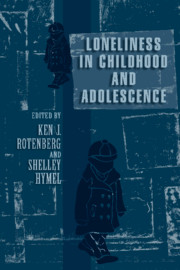Book contents
- Frontmatter
- Contents
- Contributors
- PART I INTRODUCTION
- PART II THEORETICAL AND ASSESSMENT ISSUES
- PART III LONELINESS IN CHILDHOOD
- PART IV LONELINESS IN ADOLESCENCE
- PART V PROSPECTIVE
- 16 Examination of Loneliness in Children–Adolescents and in Adults: Two Solitudes or Unified Enterprise?
- References
- Author Index
- Subject Index
- Plate section
16 - Examination of Loneliness in Children–Adolescents and in Adults: Two Solitudes or Unified Enterprise?
Published online by Cambridge University Press: 13 October 2009
- Frontmatter
- Contents
- Contributors
- PART I INTRODUCTION
- PART II THEORETICAL AND ASSESSMENT ISSUES
- PART III LONELINESS IN CHILDHOOD
- PART IV LONELINESS IN ADOLESCENCE
- PART V PROSPECTIVE
- 16 Examination of Loneliness in Children–Adolescents and in Adults: Two Solitudes or Unified Enterprise?
- References
- Author Index
- Subject Index
- Plate section
Summary
Loneliness cuts across the life cycle, affecting children, adolescents, midlife adults, and senior citizens. While loneliness is experienced by people of various ages, one can legitimately ask to what extent conceptual analyses and empirical studies of loneliness span different age periods of life or are limited to specific age ranges. Recently, Goossens and Hymel tried to assemble a symposium for the 1996 International Society for the Study of Behavioural Development meeting in Quebec, Canada to bring together child and adult loneliness researchers. Unfortunately, those individuals invited to speak on adult loneliness were not able to attend for various reasons, so only the researchers on loneliness in childhood and adolescence presented at the symposium. Goossens and Hymel's initial aim for the symposium and the difficulties they encountered in reaching it underscore that there are two camps of loneliness researchers – those concerned with loneliness in childhood and those concerned with loneliness in adulthood.
Stated broadly, our goal for this chapter is to examine points of continuity and discontinuity between childhood and adult loneliness literatures. In doing so, we hope to highlight and reflect on some of the themes we see in the childhood literature as represented in the current volume and to further illuminate the phenomenon of loneliness at all points in the life cycle. Consistent with our goal, we consider the following: (a) the evolution of work on loneliness since the 1930s to see historically how the study of loneliness in childhood and in adulthood has been intertwined, (b) several of the core loneliness topics to identify how they have been treated similarly or differently in the childhood and the adult literatures, (c) the uniquely developmental aspects of loneliness, and (d) the conclusions that can be drawn from our observations and comparisons.
- Type
- Chapter
- Information
- Loneliness in Childhood and Adolescence , pp. 325 - 347Publisher: Cambridge University PressPrint publication year: 1999
- 21
- Cited by



